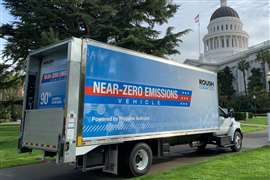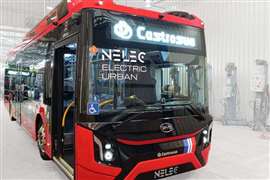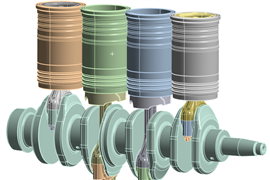Read this article in 中文 Français Deutsch Italiano Português Español
Propane postal delivery truck project shows emissions, cost savings
05 March 2024
Launched in 2021 and recently completed, the project explored the viability of propane as an alternative to diesel fuel in trucks.
In mid-2021, the Denver (Colo.) Metro Clean Cities Coalition (DMCC) launched a $1 million research pilot project to explore the viability of propane autogas as an alternative to diesel fuel for trucks. Funded by the U.S. Dept. of Energy’s (DOE) Office of Energy Efficiency & Renewable Energy, the project entitled, “Delivering Clean Air in Denver: Propane Trucks and Infrastructure in Mail Delivery Application,” saw U.S. mail logistics contractor Hi Pro, Inc. add five Class 6 straight box propane delivery trucks to its Denver fleet.
“One of the project partners on this was the National Renewable Energy Laboratory (NREL),” said Hunter Woodruff, senior manager, fleets and infrastructure for Drive Clean Colorado. “They installed data loggers on all five of the propane trucks that were added through this grant.”
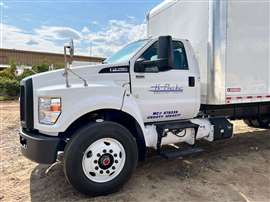 One of Hi-Pro’s propane-fueled delivery trucks. (Photo: Propane Education & Research Council)
One of Hi-Pro’s propane-fueled delivery trucks. (Photo: Propane Education & Research Council)
Woodruff said that data loggers were also installed in 15 of Hi Pro’s existing diesel trucks to compare the two different fuel types during operation.
“These data loggers captured vehicle location, the speed of the vehicles, engine related information and emissions data,” he said. “This data was captured over two one-month periods in the summer and winter to compare the vehicle duty cycles and emissions.”
The project — which was recently completed, with the final report sent to DOE at the end of January — had three primary areas of focus, Woodruff said.
“One was just comparing the duty cycles of the propane trucks to the diesel trucks,” he said. “The second one was analyzing the emissions of the vehicles. Then the third was to compare operating costs.” Regarding those costs, Woodruff said Hi Pro provided NREL with fuel transaction data for analysis.
According to Woodruff, the results were positive.
“Some of the initial data that we found is that — one, the propane trucks achieve similar duty cycles to the diesel trucks that were compared in the study,” he said. “And then in addition, the analysis found that on an energy specific basis, the propane trucks achieved an 18.9 percent reduction in combined tailpipe and production carbon dioxide (CO2) emissions, which is great, and a 98 percent reduction in tailpipe NOx emissions, which are nitrogen oxides. Then lastly, tailpipe SOx emissions, or sulfur oxides, were virtually eliminated.”
Woodruff said the project revealed propane fuel costs on an average per-mile basis were 29 percent less than diesel. In an Oct. 3, 2023, Drive Clean Colorado webinar about the project, Chris Ransom, national account manager for AmeriGas — which provided the vehicle fueling infrastructure — said that from October 2022 to September 2023, the vehicles saved over $100,000 in fuel costs.
“Just looking straight fuel for fuel — tremendous savings of $20,000 per vehicle in the first 12 months of this project,” Ransom said.
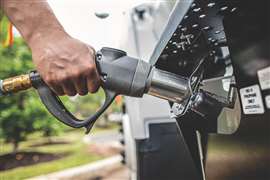 Fueling a Hi Pro propane delivery truck. (Photo: Propane Education & Research Council)
Fueling a Hi Pro propane delivery truck. (Photo: Propane Education & Research Council)
In that webinar, Joshua Stoneback, CEO of Hi Pro, said using the propane-fueled trucks resulted in a reduction in several operational costs.
“Our fuel costs have gone down,” he said. “Our maintenance costs have gone down. Our operational costs have gone down across the board. Not having DPF (diesel particulate filters) shut [down] a diesel truck — even a brand-new diesel truck will go down to a DPF issue, so that has helped our operation.”
Tucker Perkins, president and CEO of the Propane Education & Research Council (PERC), said among those at PERC, the results of the project weren’t surprising.
“I think the fact that propane is not more widely used as a medium-duty fuel is still a bit of a conundrum to us,” he said. While the project specifically sought to compare propane with diesel, Perkins said it positions propane favorably against electric vehicles, as well.
“When we ran the numbers to compare this route to using propane versus an electric vehicle, we saved 281 metric tons of CO2 compared to the same vehicle used in Colorado’s grid as it produces electricity today,” he said, adding that fleet managers should consider that climate benefit to drivers, employees and the community.
“You don’t have to make that step toward electricity that’s going to be more expensive,” he said. “Probably going to limit payload and range. To me, that was the final really interesting part of that study.”
An NREL spokesperson said publication of the project’s final report is imminent, but they were unable to provide a specific timeline.
POWER SOURCING GUIDE
The trusted reference and buyer’s guide for 83 years
The original “desktop search engine,” guiding nearly 10,000 users in more than 90 countries it is the primary reference for specifications and details on all the components that go into engine systems.
Visit Now
STAY CONNECTED




Receive the information you need when you need it through our world-leading magazines, newsletters and daily briefings.
CONNECT WITH THE TEAM










